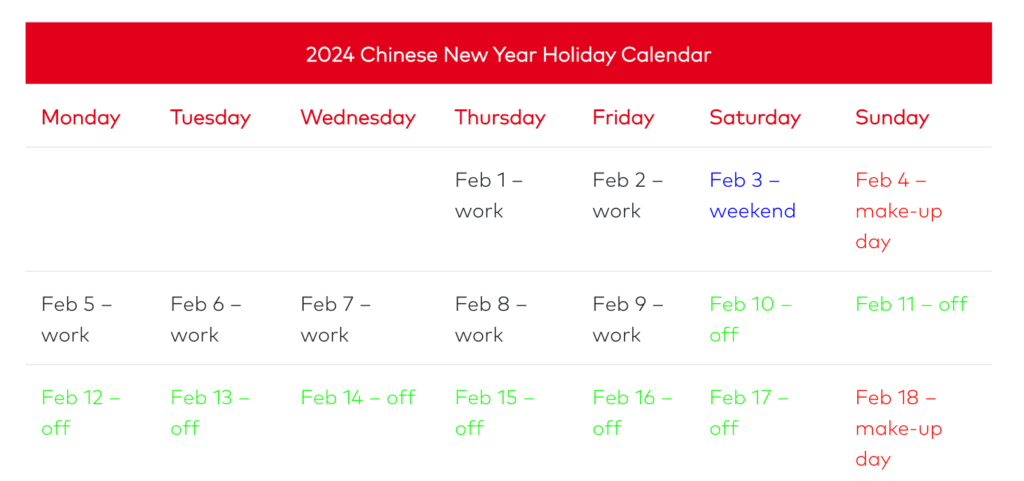Chinese New Year 2024 is anticipated to witness a surge in consumption and travel due to the extended holiday and post-COVID economic recovery. However, HR and tax teams will face challenges related to annual bonuses and increased resignations. We offer insights into tax mechanisms for bonuses, employee retention strategies, and travel and consumption trends over the eight-day holiday.
On February 10, 2024, China and many East and Southeast Asian countries will usher in the Year of the Dragon. With the lifting of COVID-19 restrictions, the eight-day Chinese New Year (CNY) holiday is expected to experience a significant rise in travel and consumption. While celebrations abound, employers must navigate the complexities of annual bonuses, resignations, and strategies for enhancing employee satisfaction and retention. This article outlines companies’ obligations regarding statutory leave, annual bonuses, and ways to improve employee retention. Additionally, we discuss predicted travel trends for the 2024 CNY holiday.
Statutory Leave and Recommended Additional Leave in Chinese New Year 2024
The 2024 CNY Holiday will run from February 10 to 17, encompassing eight days. Notably, the holiday begins on New Year’s Day (正月初一) rather than New Year’s Eve (除夕). Employers are encouraged to grant an additional day off on February 9, either as a concessionary day off or part of annual leave, recognizing its significance as an important family occasion and a day when many commence travels. Although not legally required, failure to allow this day off may affect employee goodwill. Employees must compensate for the CNY holiday by working on February 4 and 18, considered normal workdays with no eligibility for overtime or extra pay. The “New Year period” regarding travel and holidaymaking extends one to two weeks before the official holiday and approximately a week after. Companies may provide adjusted holidays, necessitating overtime pay or time off in lieu for specific days. Over the CNY holiday, February 10 to 12 constitute statutory leave, with employees working on these days entitled to at least 300 percent of their base daily wage. The remaining days off (February 13 to 17) are weekends or adjusted workdays, with employees working on these days entitled to either 200 percent of their base daily wage or time off in lieu.

HR and Tax Considerations During Chinese New Year 2024
Annual Bonuses in 2024
In China, many companies offer a one-time end-of-year bonus before or around the CNY holiday. The “13th-month bonus” is a common calculation, entailing an additional month’s salary around CNY. While not legally required, companies can implement their bonus systems. The issuance of annual bonuses has declined in recent years due to cost-cutting efforts post-COVID. A survey revealed that only 20.2 percent of white-collar workers were certain of receiving CNY 2024 bonuses, down from 26.9 percent last year, with the average bonus decreasing from RMB 8,428 (US$1,187) to RMB 6,950 (US$979). Companies, if financially able, are advised to provide bonuses as it remains an expectation for many employees and enhances satisfaction.
Tax Considerations for Annual Bonuses
Annual bonuses in China are subject to individual income tax (IIT). Two methods determine IIT calculation: Method 1 (separate calculation on the annual bonus) and Method 2 (combined calculation with total annual income). The preferential treatment of Method 1, extending until the end of 2027, offers potential tax burden reduction for some taxpayers. Employees with lower basic salaries may find Method 2 more beneficial, while Method 1 could reduce the tax burden for those with higher basic salaries.
Retaining Employees During the Resignation Season
CNY marks a peak period for job changes due to the desire to receive annual bonuses and the cultural significance of new beginnings. Economic challenges may exacerbate this phenomenon in 2024, with fewer companies offering salary raises. Companies can employ long-term strategies such as fostering a positive work environment, promoting work-life balance, ensuring job stability, addressing career development needs, and offering flexible work arrangements to improve satisfaction and reduce stress.
Travel Trends During Chinese New Year 2024
A year after the lifting of COVID-19 restrictions, CNY travel in 2024 is expected to surge compared to recent years. The 2024 Spring Festival Holiday Travel Forecast Report forecasts a 40 percent increase in total travel during the eight-day CNY holiday period, with the busiest day on February 17 as people return home.
Original Source – China Briefing





